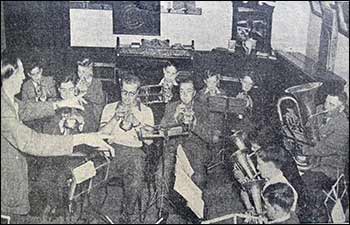Though the people of the town and district are hardly aware of it, a brave, patient struggle is going on in a Rushden band room. It is the struggle to save and bring back to prominence the Mission Church Band, once the pride of the Wesleyan Reform Union.
The plan now operating rests on the raising of a new generation of musicians. A few “old faithful” are there to provide a framework and example, but at least half the band is of boys.
To get the picture in focus, think first of the band’s history – of the evangelism, this began in 1898 and was heard, not only in the Wellingborough Road Mission Hall itself, but in the streets of the town and over the Midlands.
You might add the contest halls and wireless waves, for work in those spheres proclaimed the parent church.
For years any good judge locally would give this band the palm for playing hymns or on the march. Years of specialised experience were bound to tell. The Mission Band got mentioned in books and was an essential part of Rushden’s Sunday.
But wars, changing ideas and other factors were capable of rocking the foundations. Some activity, if only in the practice room, continued throughout World War II, but by the winter of 1942-43 public appearances had ceased. Two Mission bandsmen died in prisoner-of-war camps, another was killed in the bombing of a Rushden factory. In all, five or six members lost their lives in the war.
 |
|
The band in 1955
|
Despite these and other losses the band revived to the point of giving concerts at Rushden Hall. It was then hit hard by National Service calls, and after a while it was scarcely heard of at all.
But the “strain of praise” never quite died away, and signs of revival have been noticed recently.
Last Christmas the band played for carol singing in the Mission Church. A few weeks ago it borrowed some players and gave a programme at the garden party of the Mission Operatic Society.
The fight for survival is headed by Mr. Maurice Clark who joined the band at the aged of ten or thereabouts and has been equally happy to conduct or play solo cornet. He was, in fact conductor when the band won Section 4 at the Crystal Palace, and had charge of several broadcasts. From war service in West Africa he came back to the band in no mood to see the flag hauled down.
Even Mr. Clark cannot quite explain where the recent inflow of boys has come from. “It’s amazing,” he said. “They just come along; I think they are told by other boys.” What he does know is that about 30 boys have been “in and out” during the last two years. This means that many have not been “stickers” and that much tuition given by him and others has been in vain.
In the long run, however, the best of the young material may sort itself out.
Nine Boys
At last week’s practice – Thursday is always practice night – there were six boys among nine cornet players, and all three tenor horns were held by juniors. There were bass and intermediate instruments, mostly blown by men. The only trombone player was absent because of family bereavement, and it was explained that the drummer, being a long-distance bus driver, can seldom attend.
Most of the boys range in age from ten to fourteen, but on the third cornet was Ian Gillett, aged eight.
Each of the men makes himself responsible for training a lad. The oldest – behind the B-flat bass – is Mr. Walter Knight (72), who testified: “I joined the band when I was about 22, and I have enjoyed every minute of it.” What is more, Mr. Knight has never had a bottle of medicine.
Mr. Clark prefers that the band, instead of having a “go” at anything and everything should keep to music it can do justice to. On last week’s rehearsal list were “Deep Harmony,” “Shipley,” “Lavina” and other hymn tunes. A livelier test was the quick march, “The Old Regiment.”
Though preferring to have both hands free for conducting, Mr. Clark would sometimes pick up a cornet and help his members through an animated passage. At other times he gave separate and patient attention to one or another of the back-row boys.
One or two instruments have been purchased since the war, but many range up to 30 years of age. A full band set is available.
All members of the band are expected to devote themselves to some place of worship. The men are actually attached to the Mission.
Having managed one garden party this year, the band looks forward to attending a second one on July 16.
“Our object,” says Mr. Clark “is to be of use in the Wellingborough circuit, to which the band belongs. When we are capable we shall visit the village churches.”
|